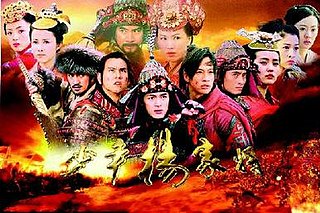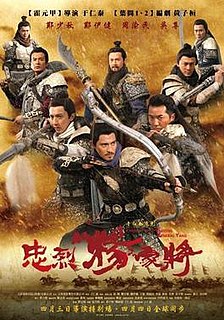Related Research Articles
Lamrim is a Tibetan Buddhist textual form for presenting the stages in the complete path to enlightenment as taught by Buddha. In Tibetan Buddhist history there have been many different versions of lamrim, presented by different teachers of the Nyingma, Kagyu and Gelug schools. However, all versions of the lamrim are elaborations of Atiśa's 11th-century root text A Lamp for the Path to Enlightenment (Bodhipathapradīpa).

Tsongkhapa was a famous Tibetan Buddhist teacher, monk, and philosopher whose activities led to the formation of the Gelug school of Tibetan Buddhism. He is also known by his ordained name Losang Drakpa or simply as "Je Rinpoche". He is also known by Chinese as Zongkapa Lobsang Zhaba or just Zōngkàbā (宗喀巴).

Tibetan tantric practice, also known as "the practice of secret mantra", and "tantric techniques", refers to the main tantric practices in Tibetan Buddhism. The great Rime scholar Jamgön Kongtrül refers to this as "the Process of Meditation in the Indestructible Way of Secret Mantra" and also as "the way of mantra," "way of method" and "the secret way" in his Treasury of Knowledge. These Vajrayāna Buddhist practices are mainly drawn from the Buddhist tantras and are generally not found in "common" Mahayana. These practices are seen by Tibetan Buddhists as the fastest and most powerful path to Buddhahood.

In Vajrayana, guru yoga is a tantric devotional practice in which the practitioner unites their mindstream with the mindstream of the body, speech, and mind of their guru. Guru yoga is akin to deity yoga since the guru is visualized in the same manner as with a meditational deity. The process of guru yoga may entail visualization of a refuge tree as an invocation of the lineage, with the 'root guru' channeling the blessings of the entire lineage to the practitioner. The guru may be visualized as above the meditator, in front of them, or in their heart. Guru yoga may also include a liturgy, prayer, or mantra, such as the "Seven Line Prayer" of Padmasambhava, or the "Migtsema".

Sikkimese are people who inhabit the Indian state of Sikkim. The dominance ethnic diversity of Sikkim is represented by 'Lho-Mon-Tsong-Tsum' that identifies origin of three races since seventeenth century. The term 'Lho' refers to Bhutias (Lhopo) means south who migrated from Southern Tibet, the term 'Mon' refers to Lepchas (Rong) lived in lower Eastern Himalayas and the term 'Tsong' refers to Limbus, another tribe of Sikkim. Society in Sikkim is characterized by multiple ethnicity and possesses attributes of a plural society. The present population of Sikkim is composed of different races and ethnic groups, viz., the Lepchas, the Bhutias, the Nepalese and the Plainsmen, who came and settled in different phases of history. The Nepali community in Sikkim is inclusive of three sub-cultural ,sectors: the Kiratis, the Newaris and the Gorkhas.
The Gallery of Madame Liu-Tsong is an American television series which aired on the now defunct DuMont Television Network. It starred Chinese American silent film and talkie star Anna May Wong, who played a detective in a role written specifically for her. The Gallery of Madame Liu-Tsong was the first U.S. television series starring an Asian-American series lead.

Likir Monastery or Likir Gompa (Klud-kyil) is a Buddhist monastery in Ladakh, Northern India. It is located at 3700m elevation, approximately 52 kilometres (32 mi) in the west of Leh. It is picturesquely situated on a little hill in the valley, in Likir village near the Indus River about 9.5 kilometres (5.9 mi) north of the Srinigar to Leh highway. It belongs to the Gelugpa sect of Tibetan Buddhism and was established in 1065 by Lama Duwang Chosje, under the command of the fifth king of Ladakh, Lhachen Gyalpo (Lha-chen-rgyal-po).
Zhu Yansi (朱延嗣) was a general of the Chinese dynasty Tang Dynasty, briefly ruling Lulong Circuit after his father Zhu Kerong's death.

The Young Warriors is a 2006 Chinese television series based on a series of novels and plays that detail the exploits of the Generals of the Yang Clan during the early Song Dynasty. The series was jointly produced by Chinese Entertainment Shanghai and Huayi Brothers Media Corporation, and stars an ensemble cast of talents from China, Hong Kong, Taiwan, the United States and Canada.
Yans (Yanzi) is a Bantu language spoken in the Democratic Republic of Congo.
The Boma–Dzing languages are a clade of Bantu languages coded Zone B.80 in Guthrie's classification. According to Nurse & Philippson (2003), some of Guthrie's B.80 are related to the Teke languages (B.70), and some Yansi varieties belong with the Yaka languages (H.30), but the rest form a valid node. They are:
The Yaka languages are a clade of Bantu languages coded Zone H.30 in Guthrie's classification. According to Nurse & Philippson (2003), with a couple additions the languages form a valid node. They are:
Teke–Mbere is a proposed intermediate group of Bantu languages, coded Zone B.50–80 in Guthrie's classification, along with the erstwhile Mbundu language Songo. According to Nurse & Philippson (2003), they are:

Saving General Yang is a 2013 Hong Kong film directed by Ronny Yu. The story is based on the legendary Generals of the Yang Family. The film was selected as part of the 2013 Hong Kong International Film Festival.

Idiofa Territory is an administrative area in the Kwilu Province of the Democratic Republic of the Congo. The capital is the town of Idiofa.
General elections were held in Sikkim in March 1967, having been due earlier but postponed after a state of emergency was declared following the Sino-Indian War. The Sikkim National Congress emerged as the largest single party, winning eight of the 24 seats. Although the Sikkim National Party won only five seats, its parliamentary faction was joined by three others.

Lim Chin Tsong was a Burmese Chinese tycoon and merchant, with business interests ranging from rice to oil. Throughout his career, he served as the sole partner of Lim Soo Hean & Company, originally established by his father, a Chinese emigre to Burma.
Gao Baoxu (924–962), courtesy name Xinggong, was the fourth ruler of Jingnan, reigning as King of Nanping from 960 to 962. He was the tenth son of Jingnan's second king Gao Conghui, and the younger brother of Jingnan's third king Gao Baorong.

18-Methylsegesterone acetate is a progestin medication of the 19-norprogesterone group which was never marketed. It was first described in a patent in 1997 and then in a literature paper in 2003. 18-Methyl-SGA is the C18 methyl or C13β ethyl derivative of segesterone acetate, and shows 3 to 10 times the progestogenic potency of SGA in bioassays. This is analogous to the case of the 19-nortestosterone progestin norethisterone and its 18-methyl derivative levonorgestrel, the latter showing substantially increased potency relative to the former similarly. As SGA is already one of the most potent progestins to have been developed, with 100-fold the potency of progesterone and 10-fold the potency of levonorgestrel in bioassays, 18-methyl-SGA is an extremely potent progestogen, among if not the most potent known.
Wang Yansi, courtesy name Jixian, was a Chinese orthodox Confucian and hermit during the Tang dynasty and Five Dynasties period. He was an adopted son and advisor to Wang Shenzhi, the first ruler of Min. Though most of his recommendations were ignored, he successfully convinced Wang Shenzhi against assuming imperial titles. After Wang Shenzhi's death, Wang Yansi went into retirement in the mountains when his adoptive brothers Wang Yanhan, Wang Yanbing and Wang Yanjun were engaged in fratricidal wars. Later in his life he taught Confucian classics and changed his name to Tang Yansi.
References
- ↑ Tsong at Ethnologue (18th ed., 2015)
- ↑ Jouni Filip Maho, 2009. New Updated Guthrie List Online